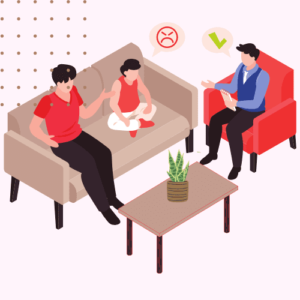
OCD Test
Answer these simple questions to understand more about your OCD. We share instant results and keep your information confidential.

What is OCD Test?
OCD assessment is a process used by mental health professionals to evaluate and diagnose Obsessive-Compulsive Disorder (OCD). It involves the systematic examination of an individual’s thoughts, behaviors, and feelings to identify the presence and severity of obsessive thoughts and compulsive behaviors. Tests may include interviews, questionnaires, and observation to gather information about the symptoms and their impact on the person’s daily life. This evaluation helps to determine the most appropriate treatment and support for individuals experiencing OCD.
Who can benefit from this OCD Test?
Anyone who suspects they may have Obsessive-Compulsive Disorder (OCD) or is experiencing distressing and intrusive thoughts, as well as repetitive and compulsive behaviors, can benefit from OCD assessment. This assessment can provide clarity and validation for those struggling with OCD symptoms, enabling them to receive an accurate diagnosis and appropriate treatment. Furthermore, family members or friends concerned about someone’s behaviors can also benefit from this assessment as it can help identify OCD-related issues and guide them in providing support and understanding to their loved ones.


OCD Test Accuracy
The accuracy of OCD assessment depends on several factors, including the expertise of the mental health professional conducting the evaluation, the comprehensiveness of the assessment methods used, and the individual’s willingness and ability to report their symptoms accurately. When conducted by trained and experienced clinicians using validated assessment tools, OCD assessment can be quite accurate. However, misdiagnosis or underdiagnosis is still possible, as OCD symptoms can sometimes overlap with other mental health conditions. Regular reassessment and open communication between the clinician and the individual can improve the accuracy of the diagnosis.
Types of OCD Test
Clinical Interviews:
One-on-one discussions with a mental health professional to explore OCD symptoms and their impact.
Self-Report Questionnaires:
Standardized questionnaires filled out by the individual, assessing OCD symptoms and severity.
Obsessive-Compulsive Inventory:
A widely used self-report scale to measure the severity of OCD symptoms.
Yale-Brown Obsessive Compulsive Scale:
Clinician-administered tool to evaluate the severity of OCD symptoms and track treatment progress.
Structured Interviews:
Systematic and standardized assessments to identify specific OCD symptoms and related impairment.
Behavioral Observation:
Observing an individual’s behaviors & rituals in controlled settings to assess OCD-related actions & responses.
Handling OCD
Handling OCD (Obsessive-Compulsive Disorder) requires a comprehensive approach that includes both self-help strategies and professional assistance. It’s essential to remember that OCD is a medical condition, and seeking help from a mental health professional is crucial for proper diagnosis and treatment. Here are some general tips that may help you manage OCD:
- Educate yourself: Learn more about OCD, its symptoms, and treatment options. Understanding the disorder can help you feel more in control and less isolated.
- Seek professional help: Consult a mental health professional, such as a psychologist or psychiatrist, experienced in treating OCD. They can provide personalized treatment plans and therapies to address your specific needs.
- Cognitive-Behavioral Therapy (CBT): CBT is the most effective therapy for OCD. It helps you identify irrational thoughts and behaviors and teaches you healthier ways to respond to them. Exposure and Response Prevention (ERP) is a specific form of CBT that involves gradually facing your fears and resisting the urge to perform compulsions.
- Medication: In some cases, medication can be prescribed to help manage OCD symptoms. Commonly used medications include selective serotonin reuptake inhibitors (SSRIs) and tricyclic antidepressants. Always follow your doctor’s guidance regarding medication use.
- Set realistic goals: Understand that overcoming OCD is a process, and it takes time and effort. Set small, achievable goals to work towards and celebrate your progress.
- Practice mindfulness: Mindfulness techniques, such as meditation and deep breathing exercises, can help you stay present and reduce anxiety.
- Avoid self-criticism: Don’t be too hard on yourself. OCD is not your fault, and recovery is a journey that may have ups and downs.
- Create a support network: Talk to friends, family, or join support groups to share experiences and find encouragement. Having a support system can make a significant difference in managing OCD.
- Reduce stress: Engage in activities that help you relax and relieve stress, such as exercise, hobbies, or spending time in nature.
- Limit compulsive behaviors: Gradually reduce the time spent on compulsions and try to delay acting on the obsessive thoughts. This practice can help you build tolerance to the anxiety associated with OCD.
Remember, OCD is treatable, and with the right support and strategies, you can lead a fulfilling life. If you or someone you know is struggling with OCD, please encourage seeking professional help as soon as possible.